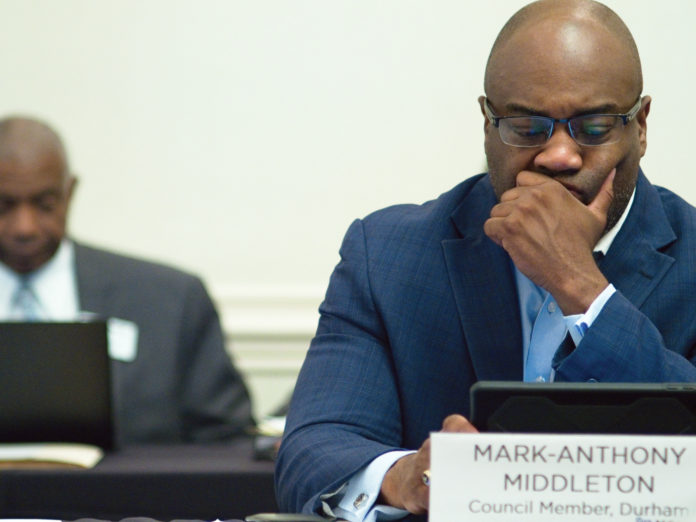Mark-Anthony Middleton guides Durham into its next chapter, asking, ‘Who’s not being heard?’
To hear Mark-Anthony Middleton speak—whether it be as a councilman for the City of Durham, on his radio show, or during his ministry at Abundant Hope Christian Church—is to settle into an authoritative space, one between dissent and discussion, protest and policy. It’s an area of balance. As an elected leader in one of the most intriguing towns in the entire Southeast, a top-down commanding approach is right there for him to take. Still, the bowtie-wearing councilman defers to the community, who he’s been working for his entire career. Speaking of the largely-aligned Durham City Council, he remembers guarding them against creating an “echo chamber where we congratulate ourselves for being so woke and in touch.” In looking at Durham, he sees its greatness and its missteps, side by side.
He calls it good governance. He admits it’s difficult. You would not know this listening to him at the pulpit—ministerial, governmental, or otherwise—because with Middleton speaking, problems seem identified. You would not know he was reluctant to take on that role. You would certainly not know that a speech impediment nearly upended his entire trajectory.
In the resolution of those issues is the makeup of the councilman and the guidelines of his outlook. “Who is not being heard?” he asks, knowing that his route to elected office was anything but inevitable. He is working towards similar resolution for Durham: one brought about by outreach and speaking up, for those without a voice and in pursuit of big things.
˘˘˘
The point that nearly derailed Middleton is also the point that ingrained in him a conviction in political advocacy. The advocates were his mother Margaret and father Benjamin, raising six children in Brooklyn, New York, in the Red Hook neighborhood—“a rough neighborhood, but we were insulated by some pretty amazing parents,” Middleton said. Margaret was a New York City public school teacher and Benjamin was a lifelong government worker, finishing his career as a chief mechanic for the U.S. Postal Service. “I had a mom that was very active,” Middleton said. “A mom that would drag me to PTA meetings.” Most impressive, though, Middleton says, is how his mom’s activism got him through school.
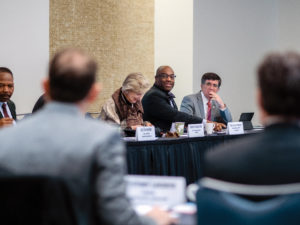
Middleton suffered from a speech impediment. In the strict, sprawling feeder structure of the New York City public school system, this was misdiagnosed as a behavioral issue and, subsequently, a learning disability. The truth was that Middleton had acted out intentionally and selectively, to avoid instances where he would be forced to speak or read aloud. Still, he was tracked out of the traditional curriculum. To Middleton, this was a casting off; a dismissive judgment to get him through school and get him out.
Margaret began a full-on campaign to change this decision, and was successful. “Her and my dad said, ‘This kid has a lot to say. He’s got a great mind. He just needs help,’” Middleton remembers. “I look at where I am now, and know that my trajectory was definitely impacted by having parents that were involved and spoke up on behalf of people that couldn’t speak up for themselves. That was a major marker for me on the importance of being in the public square and the politics of organizing.”
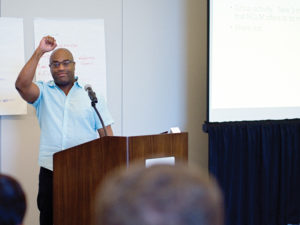
Efforts then continued at home. Margaret forced Mark-Anthony to take speaking parts at church. She leveraged teacher discounts on Broadway shows, brought her son, and made him focus on how the actors enunciated and how they used language. She’d take him to the Museum of Modern Art to see the King Tutankhamen exhibit and the gold of El Dorado. Then, she’d buy the books on the subject, and have him read aloud.
It was immersion. Read, then speak; learn, then speak; watch experts wield language with mastery, controlling a room and expressing ideas in a way you’d never seen before—and then speak. That Middleton would wield those same skills as an adult is a development he chalks up to “God’s sense of humor.” After his mother’s victory allowed her son additional resources, Middleton excelled to the point of not just avoiding a special education program, but being admitted to the special progress program. He skipped 8th grade. “That always made me ask, how many people are being written off because of the absence of people to speak up for them?”
Following high school, Middleton moved south to attend North Carolina A&T, where he picked up advocacy for himself. He organized voter registrations and various campaigns on campus, led a student organization protesting apartheid in South Africa, and fell in with a group of similar-minded friends, which included Jesse Jackson Jr. “Civil rights and philosophy nerds,” Middleton remembers them. After graduating, he moved to Durham to attend Duke Divinity School, where he stayed. Finally, in 2017, he joined the city council, taking with him the lessons gleaned from his mother’s involvement.
“As I sit on the council now, I ask myself, ‘Who are we leaving behind? Who are we discounting? Who are we leaving out? Who are we not advocating for?’”
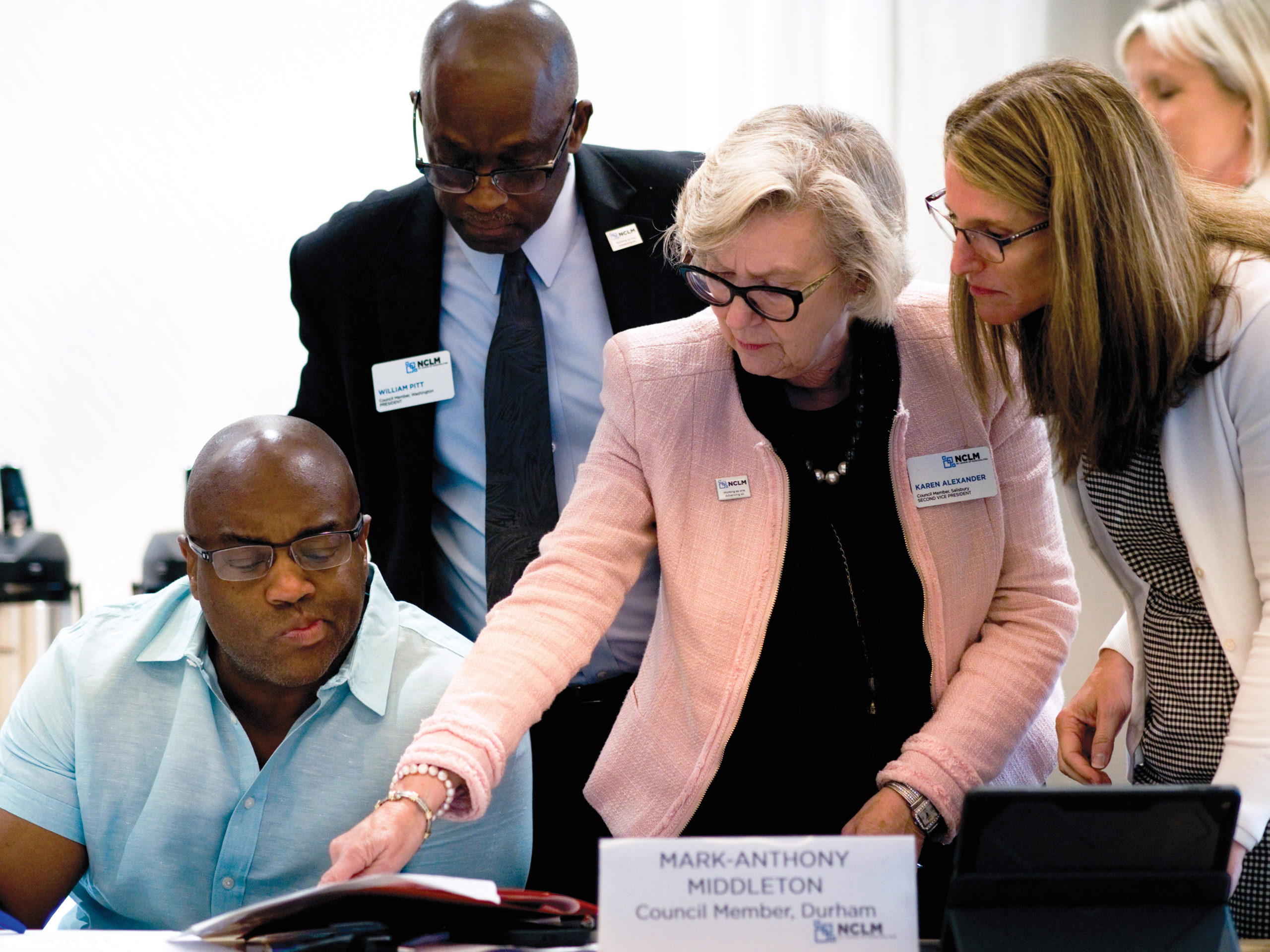
Middleton is a case study on citizen engagement. Though not unusual among local government leaders, Middleton’s commitment extends slightly further, which is a valuable approach in a rapidly growing city like Durham. He fears that key issues will be drowned out amidst the growing noise. “I encourage people all the time, ‘Hey, flood our emails!’” There are many groups that do. There are others that don’t. To Middleton, remembering the feeling of administrative dismissal, that’s an invitation for outreach.
“The thing I always talk about is voice. Voice. Voice in the process, because I almost lost mine as a child,” Middleton said. “It’s important we go out to them and impress upon them that their voices are just as important. Because I had my voice preserved through activism and intervention, my thing today is to make sure that people’s voices are not muted in any way because it has a direct impact on policy.”
That style of policy creation is by-the-book civic leadership. Middleton embraces community engagement not simply as a step in pushing policy across the finish line, but as a means to developing the policy itself. It’s in this area that Middleton really stands out, in a sweet spot among advocacy and governance.
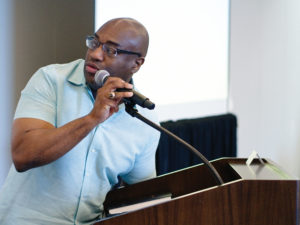
It’s a role he nearly turned down. Middleton was already prominent in the community long before holding elected office. In addition to his work as a pastor, Middleton served in a leadership position for Durham CAN (Congregations, Associations and Neighborhoods), one of the most influential grassroots organizations in the city. His work there focused on many of the same issues present today, such as affordable housing and police reform. In 2014, the New York Times featured Middleton in a story about law enforcement in Durham at a time when an analysis of state data from 2002 to 2013 showed that the city’s police searched black male motorists at more than twice the rate of white males during stops. “(The then-Durham chief of police) has to understand who runs the city,” Middleton said in the article. “He sure does now.”
That was a side of the debate Middleton was comfortable in. The people run the city, and he was their voice. When a city council seat opened up prior to the 2017 election, Middleton’s reputation as an organizer was well known, and he was approached about running. He initially declined. He hadn’t yet stepped into the sweet spot. “I could talk junk and go home, and never have to take credit for a blame or a vote,” Middleton joked. The opportunity for service, however, ultimately won the pastor over. He filed, ran, and was elected by 15 points.
In the nearly four years since joining the Durham City Council, the size and scope of the issues have only expanded. The makeup of the city, too, amplifies their significance. “Fourth-biggest city in North Carolina, fourth-most educated in the country, yet 1-in-5 are in poverty,” said Middleton. “We are faced with these paradigm-shifting, perspective-changing ideas and concepts. But as an elected official, we have to govern as well. So how do you translate that into actual policies that are financially feasible and good for the city,
a reflection of our values and also a reflection of good governance?”
His answers to those questions often find him in the news. This summer, at the height of the nationwide demonstrations calling for racial equality, Middleton proposed a policy in which social programs would receive a funding match of police departments. “That’s not defunding the police,” he said. “That’s spending … on things that would make policing less likely.” He has proposed a municipal experiment with universal basic income: a 12- to 18-month test run that would give 200 to 300 people up to $1,000 a month, and then study whether that financial support helped root out the underlying causes of larger social issues. Perhaps most of all, he’s focused on unreported gun fire—what he calls a morally unconscionable problem, in which the implications are ones of hopelessness and distrust. “It means we have people living in our city who have resigned themselves to the notion that this is the way it is in my neighborhood. It’s unacceptable.”
Being an elected official in Durham is “no joke,” as Middleton puts it. “It’s like being on the set of a Marvel movie. You have all these incredible people with all these super powers, and there’s always some threat that’s looming over the horizon.” Again striving for balance, he understands the two sides of the role he has to play. First, he is a brand ambassador for a city that he calls the toast of the country: burgeoning food scene, elite educational institutions, growing population, and a revitalized downtown that serves as a model for model for Main Streets statewide. And second, he is a truth teller. Unfortunate truths. The poverty rate, the dilapidated public housing and, again, the gunfire. “I don’t shun celebrating Durham, but also chastising her as well. Being an elected official in Durham, an effective one, means you have to do both, sometimes in the same day.”
His favorite line, which he took from the West Wing, is “What’s next?” He says it’s a daily motto. “You get up each day and ask ‘What’s Next?’ and you keep plugging away, you keep trying to build relationships and build alliances and tell the truth and remind people that, on our best day, there’s still a piece that we’re not getting.”
He says this on Wednesday afternoon. What’s next is a day spent mostly in a city council work session, and on Friday he’ll be visiting local classrooms to talk local government and civics. Kids see him on television, wearing a bowtie, and will come to school in a bowtie the next day, to be like him—that’s his favorite part of the job. Saturday morning, he’ll take up citizen engagement again, on the airwaves, discussing the topics on an FM station that extends as far as Rocky Mount. Sunday, he’s stands at the altar, Pastor Mark. And Monday, back at it, beginning the seven-day work week again.
He’s busy, but a good busy. He sees a lot of issues still to be addressed, and a lifetime to work on them. “Whether I’m elected or not elected, I’ll never disengage. I’ll always be involved in some aspect of public life. I’m excited about that.”


